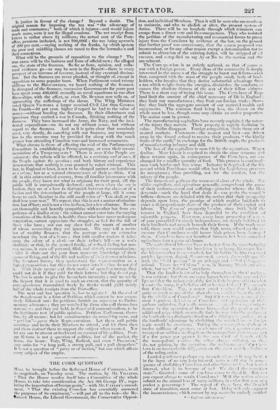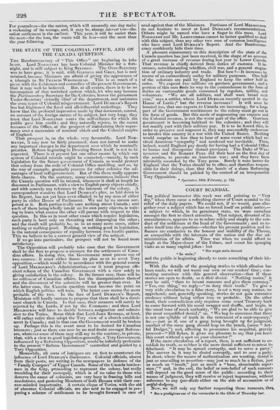TIIE CORN QUESTION \Vim, be brought beffire the Refbrmed House
of Commons, in all its magnitude on Tuesday next. The motion, by Ali.. Thaoalts, " That the noose resolve itself into a Committee of' the whole Rouse, to take into consideration the Act 9th George IV., regu- lating the importation offoreign grain,"—with Mr. CAYLEY'S amend- ment, " That the existing Corn-law has essentially answered the purposes of its enactment,"—will put all to the test—the Re- formed House, the Liberal Government, the Conservative Opposi- _don, and individual Members. Then it will be seen who are resolveu to maintain, and who to abolish or alter, the present system of duties. There will be no loophole through which trimmers can escape from a direct vote and its consequences. They who resisted the petition of the manufacturing and commercial towns to prove injury from the Corn-laws by evidence at the bar, on the ground that further proof was unnecessary, that the course proposed was inconvenient, or for any other reason except a determination not to submit to alteration of the existing duties, will be stripped of dl excuses, and compelled to say Ay or No to the motion and the amendment.
The Corn question is as strictly national, as that of peace or war with a fareign power. Every class of the community is deeply interested in the success of the struggle to burst our fetters—even that, compared with the mass of the people small, body of land- holders, who imagine that they derive substantial ativentage from a tax which weighs down the energies, diminishes the comforts, or causes the absolute distress of the rest of their fellow citizens. There is a short way of trying this issue. The Corn-laws of Eng- land limit the amount of the chief necessary of life in England ; they limit our manufactures ; they limit our foreign trade ; there- fore they limit the aggregate amount of our materisl wealth and enjoyments. The common fund being less, the shares on the whole must be less, though some may obtain an undue proportion. The nation must be poorer.
The manufacturing capitalists have recently explained the nature of the injury they sustain. Their property is rapidly declining in value. Profits disappear. Foreign competition shuts them out of neutral markets. Customers—the nearest and best—are driven away by the forced refusal to receive their products, " the kindly fruits- of' the earth," in exchange for the British staple, the products of manufacturing industry and skill.
The loss of the cepitalists is soon felt by the operatives. Wages decline. 'Afore labour is required to obtain the same returns; and these returns again, in consequence of the Corn-laws, are ex- changed tbr a smaller qnantity of rood. 'Phis process is continual t men work harder and tre worse. Industry is depsived of the fair reward which Providence would offer, but the Legislature preveets its acceptance ; thus providing, not for the comfort, but the misery of the people.
The farmers are perhaps the worst-used class of the whole. For whilst capitalists, and operatives generally, comprehend the cause of their embarrassment and suffering—perceive whence the blow descends—marls the hand that deals it—call probe the svound it inflicts—ffirmers are deluded with the notion that •their prosperity depends upon laws, the prestige of which enables landlords to exact a disproportionate share of the Tr-mince of their capital and
labour. The f1;amsrs' prosperity h—why, since Is Ii, half the tenants in England have been degraded to the condition of miserable paupers. Even now, a very large propor.:ion of a ra:ss, of yore proverbial. fir stusdy independence, are deep1.y '-s1,•bted to their landlords and crouch beneath their frown. If the troth were told, these men would confess that high rents. orK:r0,1 ,s1 the ns. surance that Corn-laws would insure high prices, have :1estroyed them. Cosn-1::::s have not benefited fin-mess:, bet IVINT
agricultuse iato a game of chance.
The agri:adtural lahnerer fares no better than the ops.stiye—nay, worse : his hread-tax is as heavy, his w:a-es lesa: the labaer-market iS ovens:toed:zed, but his habits tie him to a reral
parish : ign dne:1, .1i ,eon tented. savage. the we a:10.1•aise goal, the "it: ii pa.: siet" is an unhappy and ,s1-1.1s.1 .1angs:rsos
•
animal. There are Unions" now, in Romney .Massli sad els,- where, but no " Aaletrns" anywhere.
That the Int.:dies-1s lats/a/ to help themselves by the Csrn-lass 4.
is too evident : but ti: re ::re many lep,zes h' 'n the cap and ths
lip: and that the imin4t rsiin °fill(' the is :I, in prosstioA to whet it costs the many, is a !of let' as old at 1 •t ,!' rso
first Cateehism. nty, a newer creed t. es!e•-, .1,1; quite as much m: any of the other ela by the 0151/51/ II of Corn-l.e.vs.'t And if it most ingenious ele11.m.lers of Corn-law, authors maintains, that really rents nr., degree by the operation of those additional price which event-m:11y finds its \s" ,
the landlords is a diminutive fraction of .
the landlords" advantage lw eholishin7 rie .:as • -1 trade would be en:ea:Ions. TaIira- the c essnop:isil I' oh a,
twelve millions of (In:niers, 01 al,stnee (imistcr 4 twenty-four millions sterlin:t fsm the monopolists' en-ion-Ass : and it' a few penve per quarter h0 t Otni 1.,'1!0 it V..11, the tnen0p0HAtS n'eeiVe---t ¶10 e. her elas:os: sn11'cring, as the:: do, not gaining, by the operation-- the ins1ste-naece or tl-c Cor!!-
For yourselves—for the nation, which will assuredly one day make a reckoning of its wrongs, and, it may be, charge interest too—the safest settlement is the earliest. This year, it will be easier than the next—for the loss, the waste will be less—and the next than the year following.



























 Previous page
Previous page